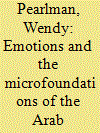|
|
|
Sort Order |
|
|
|
Items / Page
|
|
|
|
|
|
|
| Srl | Item |
| 1 |
ID:
117857


|
|
|
|
|
| Publication |
2012.
|
| Summary/Abstract |
The role of small states has been largely neglected in research on the process and outcome of multilateral negotiations. Even though these states may be active in the agenda-setting processes or display a specific engagement in certain thematic aspects of negotiations, in the end game the outcome of negotiations has been perceived to be dependent on the bargaining between major powers. However, small states also have strategies at their disposal to compensate for these weaknesses. Two principal ones come to mind, prioritization or niche diplomacy, and coalition-building to join forces with like-minded states in order to draw on their resources, expertise and manpower. In the article, we compare two cases of small state coalitions in multilateral negotiations, namely the Like Minded (LM) group in the negotiations that led to the establishment of the International Criminal Court (ICC), and the Alliance of Small Island States (AOSIS) in United Nations climate negotiations. While the two coalitions resort to similar strategies, they have not been comparably successful. We will show that the ability to translate discursive power into measurable effects on outcomes ultimately depends on the institutional setting of the negotiations and the nature of the issue that coalitions are tackling.
|
|
|
|
|
|
|
|
|
|
|
|
|
|
|
|
| 2 |
ID:
131688


|
|
|
| 3 |
ID:
121596


|
|
|
|
|
| Publication |
2013.
|
| Summary/Abstract |
In any political setting, a few people will defy political authority. The main challenge for theories of rebellion is to explain when and why others join en masse. Scholarship on social movements typically develops answers to this puzzle on the basis of either of two microfoundations. Explanations that conceptualize individuals as utility-maximizers contend that they protest as a means to other ends. Explanations that see individuals as driven by values and beliefs suggest that people protest for the inherent benefit of voicing dissent. Both perspectives generate compelling explanations. Yet how do purposeful individuals act when utilitarian calculations and cherished values recommend contrary courses of action? Why might an actor prioritize one or the other at different points in time? Taking on these questions, I argue for an approach to microfoundations that focuses on emotions. Emotions such as fear, sadness, and shame promote pessimistic assessments, risk aversion, and a low sense of control. Such dispiriting emotions encourage individuals to prioritize security and resign to political circumstances, even when they contradict values of dignity. By contrast, anger, joy, and pride promote optimistic assessments, risk acceptance, and feelings of personal efficacy. Such emboldening emotions encourage prioritization of dignity and increase willingness to engage in resistance, even when it jeopardizes security. When instrumentality and values offer different answers to the question of whether to resign or rebel, therefore, emotions can shift individuals toward one or the other. I ground this argument in findings from the neurosciences and illustrate it with evidence from the 2011 uprisings in Tunisia and Egypt and the absence of an uprising in Algeria.
|
|
|
|
|
|
|
|
|
|
|
|
|
|
|
|
| 4 |
ID:
105452


|
|
|
|
|
| Publication |
2011.
|
| Summary/Abstract |
Prior research in political science and other disciplines demonstrates the pedagogical and practical benefits of active learning. Less is known, however, about the extent to which active learning is used in political science classrooms. This study assesses the prioritization of active learning in "gateway" political science courses, paying specific attention to simulations, structured debates, and the case method. Nearly five hundred individual course syllabi for introductory-level political science courses are examined. Although the level of active learning prioritization is surprisingly low, the dimensions on which it varies suggest opportunities for adoption across subfields and classes of varying size.
|
|
|
|
|
|
|
|
|
|
|
|
|
|
|
|
|
|
|
|
|